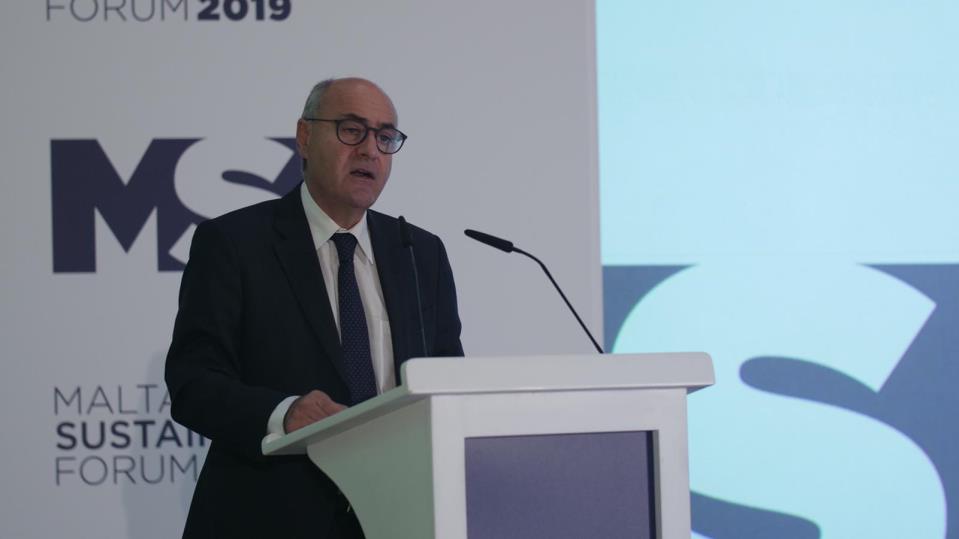We are struggling to come to terms with how we manage our natural resources within a context of a real and present danger to our natural world and our planet itself, President George Vella said today.
Addressing the Malta Sustainability Forum, organised by APS Bank, Vella said Malta’s corporate world needs to do more and better in meeting its social corporate responsibility. Over the past decades, Malta’s construction industry has grown exponentially and more built up areas are directly impinging on the health and psychological well-being of the nation.
It is important that the industry understands that this growth, while bringing considerable material benefit to some, must also bring with it a full understanding of the duties which are owed to the country as a whole. This is not only a matter of being generous in funding good causes and charitable institutions, which Maltese companies largely do, but also a matter of playing a direct and effective role in improving our collective social, cultural, economic and environmental well-being.
“All of us need to understand that we are guardians of the natural world. I am proud to recall that back in 1967, Malta already identified the global commons as an important shared element and tabled a United Nations proposal which gave birth to the doctrine that states that the seabed, ocean floor and sub-soil, are ‘the common heritage of mankind’, and should only be used and exploited for peaceful purposes and the benefit of mankind as a whole,” he said.
The eminent philosopher of the enlightenment, John Locke, in his defence of private property wrote that one is entitled to take from nature what one requires for one’s own use provided that there “was still enough and as good left” for others to enjoy. This is a critically important proviso. It means that when we take from nature, we have obligation to ensure that others will have the opportunity to take in the same manner and of the same quality. The “enough and as good” qualification lies, I suggest, at the very heart of sustainability, Vella said.
Primarily, it is in the hands of politicians to enact legislative frameworks that safeguard the environment and ensure every company operating in the country holds strong corporate social responsibility standards. It is in the onus of regulators to ensure the natural environment is protected and human capital provided with the necessary tools to develop their full potential, he said.
“Secondly, we need to recognize our central individual role. Yes, you and me - making smart and sustainable choices to bring about tangible and long-term change. There is no need to succumb to extreme austerity measures, where we feel that all the ills of our planet fall upon our individual shoulders. Likewise, we should eschew fatalist approaches where we feel nothing can be done by us as individuals. While the behaviour of the big corporations is a fundamental challenge to sustainability, we each have a responsibility to protect our natural world,” he said.

In his address, Environment Minister Jose Herrera said sustainable development has been an integral part of the government’s agenda for the past years, and much good work has already been done in this area across all sectors.
“However, I must admit that the path towards a more inclusive and sustainable future that satisfies our needs without jeopardising the prospects of future generations is far from easy. In order to get there we need rapid, far-reaching and unprecedented changes in all aspects of society,” he said.
With Malta’s economy growing at an impressive rate, the question is often about how sustainable is this growth. Sustainable economic growth cannot be seen in absolute economic figures but these need to take into account socio-ecological implications. Policies or initiatives discussed today are bound to fail in the longer term if we do not seek to maximise economic, social and environmental goals, Herrera said.
Environmental protection and natural resource management, economic success and social equity are interdependent. For instance, the aspiration to achieve a low carbon economy may be misconceived as a deterrent to further economic growth. On the contrary, transitioning towards a low carbon economy protect against unsustainable economic growth whilst also creating new business opportunities and new, complementary employment opportunities.
It is in this context that the relevance of the United Nations 2030 Agenda for Sustainable Development and its 17 Sustainable Development Goals (SDGs) should be framed. Whilst meeting all 17 SDGs by 2030 is a challenging and daunting task, yet it offers countless opportunities for further investment and innovation, new partnerships and international cooperation as well as new strategies and policies, leading up to an improved socio-economic development and environmental conservation.
Our experience with SDG implementation shows that the cross-cutting nature of the SDGs results in coordination challenges at every level of the decision-making process often leading to divergences arising from different sectoral interests. It therefore requires Government to strengthen existing mechanisms and establish clear mandates for vertical coordination (between national, local and regional levels) and horizontal coordination (between Ministries, Entities and Departments).
Establishing SDG implementation platforms composed of key stakeholders including civil society and industry representatives is essential in managing cross-sectoral coordination and overcoming difficulties and increasing accountability. In order to tackle this, Government has established a coordination mechanism underpinned by the Sustainable Development Act. The purpose of this Act is to create a framework through which sustainable development is mainstreamed across all workings of government, he said